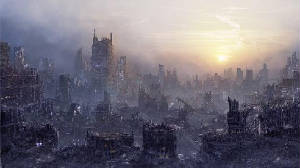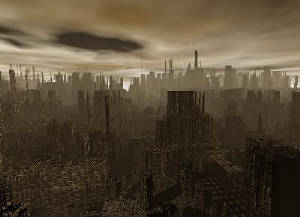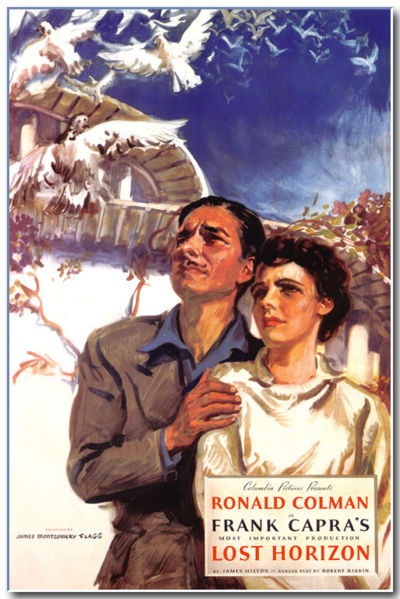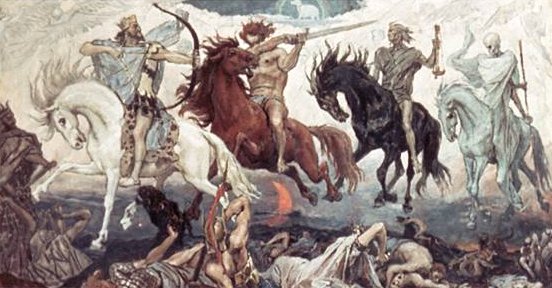A list of Top 50 Dystopian Movies of All Time is making the rounds, and it’s quite good. The ranking was  a bit odd, combining the scores of both Rotten Tomatoes and IMDB (Internet Movie Data Base) to get an average approval rating (1 to 10, with 10 being best). As such, Metropolis, the 1927 silent classic finished at the top with an 8.6 average. Along the way, there’s lots of good films, covering decades of film making.
a bit odd, combining the scores of both Rotten Tomatoes and IMDB (Internet Movie Data Base) to get an average approval rating (1 to 10, with 10 being best). As such, Metropolis, the 1927 silent classic finished at the top with an 8.6 average. Along the way, there’s lots of good films, covering decades of film making.
Many of the movies on the list are now considered sci-fi classics. Some of my personal favorites are Brazil, Children of Men, Gattaca, Minority Report, Blade Runner, Mad Max (Road Warrior and Beyond Thunderdome), Strange Days and War of the Worlds (1953). It was  also good to see Logan’s Run, Silent Running and Soylent Green make the list — films I cut my speculative teeth on as a kid.
also good to see Logan’s Run, Silent Running and Soylent Green make the list — films I cut my speculative teeth on as a kid.
But reading the list also got me thinking in other directions. For instance, is there anything but dystopian sci-fi?
Maybe I should back up. Dictionary.com defines dystopia this way:
a society characterized by human misery, as squalor, oppression, disease, and overcrowding.
The folks at Snarkerati, in assembling their Top 50 list, add to the concept and incorporate it into the genre of cinema:
Massive dehumanization, totalitarian government, rampant disease, post-apocalyptic terrains, cyber-genetic technologies, societal chaos and widespread urban violence are some of the common themes in dystopian films which bravely examine the ominous shadow cast by future.
So, in essence, a dystopia is the antithesis of a utopia — an imperfect world.
 Back to my question: Is there anything but dystopian sci-fi? I mean, “Massive dehumanization, totalitarian government, rampant disease, post-apocalyptic terrains, cyber-genetic technologies. . .” — this is the stuff of science fiction. We don’t do utopia.
Back to my question: Is there anything but dystopian sci-fi? I mean, “Massive dehumanization, totalitarian government, rampant disease, post-apocalyptic terrains, cyber-genetic technologies. . .” — this is the stuff of science fiction. We don’t do utopia.
Perhaps it’s just the need for drama that keeps us interjecting aliens, microbes and runaway cyborgs. Face it, utopian tales would seem awfully boring without the threat of impending apocalypse or a sinister Republican president. Nevertheless, we’re bent on showing that advanced societies and man’s drive for perfection, contains a built-in malfunction.
I’m intrigued by that premise, if it is indeed true, because it hinges on a very biblical worldview.
Utopianism, as far as I can tell, is rooted in modernity — the belief that technology and human ingenuity can build a better world. Industrialization bolstered the utopian dream, leading us to believe we could harness the better angels of our nature, conquer disease, aging, poverty, etc. But it wasn’t long before reality sunk in. Several world wars, genocides, natural disasters, governmental collapses and overthrows, and, mostly, our predisposed madness, has deflated the notion that we could right the world’s wrongs. There isn’t enough silicone on earth to keep us from sagging. Dictators rise. Country’s fall. And as long as a human walks the earth, dystopia is inevitable.
Sure, it sounds pessimistic. But it’s a fact. Manmade utopia is an oxymoron.
As uncomfortable as it is, that observation squares with Scripture. The Bible does not paint a rosy picture about the fate of mankind. Accordingly, all our peace treaties, technological advances, and therapeutic skills land us in Armageddon. Far from Shangri la, we end up in an arena, pitted against God, nature and, each other. No amount of firepower or psychobabble can stave of these approaching hoofbeats. Sounds like a great movie, huh?
The genre of dystopian films, maybe more than any other, reinforces a vital biblical theme — Man is broken. History and experience bear this out. Dystopia far more accurately reflects the human condition than does utopia. The doctrine of human depravity, whether it’s called that or not, is what fuels dystopian worlds.
So whether it’s 1984’s Thought Police, Blade Runner’s glitching replicants, or Minority Report’s precrime unit falling prey to itself, something rings true about a screwed up future. Why? Just look in the mirror. After all, even Eden had its Serpent.















I think the huge popularity of Star Trek is due to the positive outlook it presents for the human race.
Yeah, first we have nuclear holocaust, but then we get over it and build a better society. In fact, we thrive and surpass all other cultures.
Besides the abolition of Christianity, the Star Trek future is a Utopian ideal of the future. It seems our natural instinct leads our imagination to bleak futures. But, Gene Rodenberry has made a fortune showing us another way.
Though I should point out, being an inveterate Trekker (NOT Trekkie — I don’t do NO POINTY EARS!), that DEEP SPACE NINE set out to blacken the eye of that rosy future. By the time we ended the series, we had the Federation in league with the (formerly evil) Klingons and Cardassians and happily contemplating the genocide of the Founders. Of course, there are those that mark the decline of the franchise with that debut!
You are right on, Mike. Maybe that’s why I don’t like the genre–that and showing hope in demonic imaginings as the better part of “space”.
Dale, I think you’re right about Star Trek’s utopian vision but, as I mentioned in this post, most of the drama is dystopian in nature. Whether it’s shape shifters, alien spores, alternate realities, or technology run wild, the universe Kirk and crew inhabited was anything but perfect. Heck, interplanetary crises were the norm on Star Trek. The Enterprise would not have needed shields and laser beams if there weren’t enemies of the ideal. Klingons may not be conducive with utopia, but they were great for the show.
Yes, Mike. But correct me if I’m wrong-you were speaking of the idea of human nature spawning these dystopia ideas. That humans are inherently defeatist and therefore see a bleak future everywhere they look.
And, in the case of Star Trek, the humans were the positive ones. Not the defeatist.
And, we’ll forget the fact that all of the other races were actually metaphors for the different aspects of our own personalities. Klingons represented our propensity for war. Vulcans represented our Eastern Buddhist type thinking. The guys with the big ears represented our greed and lust.
BTW, I’m speaking of “S.T. The Next Generation”.
But, your point is still valid. Given that Star Trek is the only one.
But the popularity is there for a reason. It bucked the trend you’re speaking of. And, for some reason, other writers haven’t follow it’s lead.
That’s why I love ST-TNG- I’m an optimist.
I think you’re onto something, Mike. Even among unbelievers, there seems to be an innate sense that we as a race are doomed despite our best efforts, and it shows up in those films. It’s almost like we need a savior or something.
In case you are yearning for not dystopian SF, I’ll recommend Ursula K le Guin’s stuff.
Her novels are also particular in that, while recognizably SF, they are not even particularly related to our timeframe at all (The Hain empire might be in the far past or the far future, no one knows for sure; _Always coming home_ /is/ a post-catastrophe society, but the novel is not about that at all, mostly the protagonists do not care).
Anyway, it is good to read something that is neither «now we have science and we will fix things!» and «society has made us bad and unhappy».
Anne McCaffrey and Lois McMaster Bujold also have essential utopias — while there are certainly glitches in every system and there are “bad people”, the societies themselves are utopian — egalitarian, gender-equal, poverty-free, democratic, educated and resource-equitable.
Again, Barrayar is an exception to the Rule and Beta Colony the supposed norm — the visit to Earth is remarkably peaceful. As well, McCaffrey’s Pern is essentially at peace internally. The threat is almost always from without, whether Thread, disease or (the occasional) “bad guy”.
Have you read the Hunger Games Trilogy? I don’t see it as sci fi, but it’s futuristic. Extremely well done. And extremely hollow as you turn the last page, because in the end, for the characters, there is no God, no true salvation. Haunting.
I love Dystopian imaginings. Currently reading the Redaction Trilogy.
The point of my comment is to let you know about Dystopian musical artists.
Aes Dana is very good with the album “Pollen” being a particular highlight.